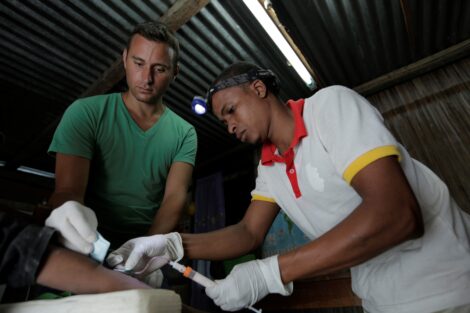May 5, 2023—Harvard T.H. Chan School of Public Health’s Christopher Golden is among the recipients of the National Science Foundation (NSF)’s recent $140 million investment in artificial intelligence (AI) research, development, and implementation. He will co-lead a project aimed at strengthening the public health system in Madagascar through AI tools. The project will fall under the Carnegie Mellon University-led AI Institute for Societal Decision Making (AI-SDM), one of seven new AI institutes established with the NSF funding.
AI-SDM will focus on creating tools that enable people to better predict and respond to uncertainties and resource constraints during disasters and in settings of poverty. Its goals differ from “tech-oriented or capital-generating AI,” said Golden. “It’s about how AI can produce more efficient, more just, and overall better decision making to improve society.”
Golden is an assistant professor in the Department of Nutrition and has appointments in the departments of Global Health and Population and Environmental Health. He and Milind Tambe, Gordon McKay Professor of Computer Science and Director of the Center for Research in Computation and Society at Harvard, are coming together in what Golden calls “a really nice cross-campus collaboration” to co-lead one of Harvard’s projects within AI-SDM. He also noted that Francesca Dominici, professor of biostatistics at Harvard Chan School and co-director of the Harvard Data Science Initiative, has a “foundational role” in the project.
“Our dream is to have a functioning climate-smart public health platform—a software-engineered data system in which new data coming in from health facilities will seamlessly be overlaid with climate layers, environmental layers, and social layers,” Golden said. “This will allow people to see the relationships between all of these factors and best predict where, when, and to what extent things like diseases and disasters will burden populations, especially ones already on the margins.”
Golden and Tambe have chosen Madagascar as the project’s setting because of Golden’s deep experience there: He’s been conducting ecological and public health research in the country for more than two decades and maintains a close relationship with the Ministry of Health.
“Because we have a ready and willing audience in the government and access to high resolution and longitudinal data, Madagascar serves as very fertile ground for us to make transformation,” Golden said. “Ministry of Health officials have already come to Harvard for consultative sessions and we frequently discuss our plans. It’s very much a co-produced project.”
Such transformation could include using AI technologies and techniques, such as remote sensing, satellite mapping, and machine learning, to predict environment and climate-related health crises such as the links between drought-induced crop failure and malnutrition or deforestation and diarrheal diseases; optimize the locations of new clinics based on population-level health data; and ensure continuous availability of drugs at health center and hospital pharmacies, especially during seasonal spikes of disease.
While these applications will be tailored to the context of Madagascar, they also serve as proof of concept for AI’s public health potential, and as replicable models for work in low-resource settings around the world. Golden said that he, Tambe, and their teams of postdocs will develop AI systems to work with District Health Information Software 2 (DHIS2), an open-source health information management system that is used to collect, store, and analyze population-level health data in Madagascar and in 75 other countries comprising 3.2 billion people, or 40% of the world’s population.
“If we can develop our platform to integrate with DHIS2, it will be globally transferable—other countries could implement it within their own contexts and for their own public health needs,” Golden said. “That is really exciting.”
Photo: Jon Betz/National Geographic Society
